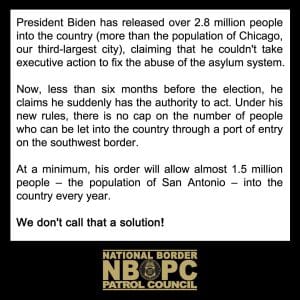It seems only appropriate that the Office of Special Counsel delivered its report on the failings of Administratively Uncontrollable Overtime, known in federal circles as AUO, on Halloween.
The Washington Post coverage of the report focused on the aspects of the Treat, referring to the “candy bowl” of overtime money from which some Homeland Security employees have unethically dipped. But the most unappetizing aspect of the issue is the Trick being played on taxpayers, that the government continues to employ a broken and bloated pay system even though an efficient and remarkably logical solution is well within reach.
The AUO pay system has been dysfunctional for years now and is indeed being abused by some federal workers; however, it’s the system Congress gave us. We try to make the best of it, but our mission involves patrolling over 9700 miles of border each and every day, an immense amount of land to cover.
The 10-hour shifts for which AUO can provide are a necessity, given that our agents may face four-hour round trips to get to and from some of the most hotly contested spots along our border. But with the current limitations of our compensation system, Border Patrol agents are forced to play “goal line defense” every single day. Even though Customs and Border Patrol is the largest uniformed police force in the world, our compensation system is lagging behind that of other agencies. The truth is, our pay system is a relic, older than most of our agents.
With illegal immigration once again on the rise along our southern border, it’s becoming even clearer that the need for change is urgent. Not only have we recorded higher border traffic in areas such as the Rio Grande Valley in South Texas, but we find more and more people from countries other than Mexico are now trying to cross illegally into the United States.
During the economic downturn, the United States became less financially appealing to potential illegal immigrants, leading to far fewer apprehensions. But now, as the U.S. economy recovers, the number of attempted crossings is climbing fast. In just the last year, our border patrol agents made more than 420,000 apprehensions, a 15-percent leap over the previous 12 months. And these numbers will only continue to grow as our economy continues to stabilize.
Thankfully, a solution is on the immediate horizon. Sen. Jon Tester (D-MT) and Rep. Jason Chaffetz (R-UT) both plan to introduce bills that will both improve the security of our borders and save the money of U.S. taxpayers. This bipartisan agreement will save our taxpayers $130-million a year, while allowing Border Patrol agents to work the hours we need in order to better secure our borders.
As the Office of Special Counsel explained in its report to the White House, “the lack of progress in implementing [reform] plans first outlined five years ago raises questions about the agency’s willingness or ability to confront this important problem.” But members of Congress from both parties, like Rep. Chaffetz and Sen. Tester, are clearly ready to reform our pay system and save taxpayers $1.3-billion over the next ten years.
With this solution so close at hand, we must ensure that necessary pay reform and the substantial budget reductions it would bring don’t fall victim to the misdeeds of a few. Our Border Patrol agents serve this country honorably and place their lives at risk on a daily basis: border security is our top priority, plain and simple. But in order to successfully pursue that priority, we need a fair pay structure that enables us to get the job done safely and effectively.


